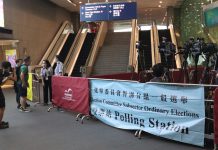The introduction of the minimum wage also means there are many other jobs in the same salary range and frontline elderly care workers at elderly homes often leave their jobs for better ones.
“Many colleagues quit after the $28 minimum salary policy. They would rather work at restaurants than doing this ‘dirty job’ here in an elderly home. It is less demanding elsewhere,” says Danny Chan Ka-ming, the warden of Wah Fung Nursing Centre, a large private home for the elderly with 557 beds.
Currently, the guidance from the government suggests a ratio of one nurse to 30 residents. Chan says this is, “an impossible ratio” because many residents require a great deal of attention and medical care. The government’s recommendation does not provide for enough carers to give the care the elderly need.
Yet many care homes are too short of staff to fulfil even this requirement.
Chan says he cannot solve the problem by raising the salary of frontline staff.
The Wah Fung Nursing Centre charges between HK$5,500 and HK$8,000 a month for each bed. Chan says the home has a monthly income of around HK$1.5 million.
“Sounds like a lot, right?” he says, “Okay, here is the expenditure breakdown: $1.2 million on the salaries for the one hundred staff, seven hundred thousand dollars on rent, one hundred and twenty thousand dollars on electricity. . .you do the maths. This is reality, and I haven’t even got to insurance, necessaries and other expenditure.” Chan says he faces a deficit every month.
The shortage of financial support hinders the provision of better services while the aging population has put enormous financial pressure on the government, especially in the past 10 years.
According to the Census and Statistics Department, around one in every eight people in Hong Kong is aged 65 or older. This is expected to climb to around one elderly person in every four people by the end of 2030.
Professor Alex Kwan Yui-huen, the head of the Department of Applied Social Sciences at City University of Hong Kong, says demand far outstrips supply in the provision of elderly services. He says some homes are even illegally hiring foreign domestic workers to solve their staffing problems, but adds that does not help. “It will get even worse as there has been no increase in resources, while the demand for these services has risen steadily,” he says.
The demand is so great that it means that each old person has to wait at least two to three years before they are offered a place at a government-funded elderly home. Theresa Tong of Angel’s Health Care says, “Some have even reported waiting for seven to eight years and last year there were 7,000 elderly people waiting in line for a place at the government funded homes.”
Critics say the number of government-subsidized beds in homes, which charge about $2,000 a month and have higher quality of service generally, is not enough. A bed in a private-sector home can cost up to HK$8,000 a month and service quality can be inconsistent and unpredictable.
“I heard that government-funded ones are way better, so I went for that. But I have been waiting fo r almost three years now and there is still no reply. I bet that till the day I die they[the government funded elderly homes] will still be unavailable,” says 76-year-old Au Gou-mei.
r almost three years now and there is still no reply. I bet that till the day I die they[the government funded elderly homes] will still be unavailable,” says 76-year-old Au Gou-mei.
Professor Kwan of City University is one of the critics of the government’s policy for the elderly. He says Hong Kong’s welfare policy does not cater for the long-term care of the city’s rapidly expanding elderly population.
Kenneth Chan Chi-yuk, first chairman of the Elderly Services Association of Hong Kong, describes the problem as a deep-rooted one because the only financial aid available to the elderly in relation to private care homes is the Comprehensive Social Security Assistance (CSSA). Yet the CSSA was never designed to meet the needs of the elderly in long-term care, it was meant to provide a safety net for the most needy.






































